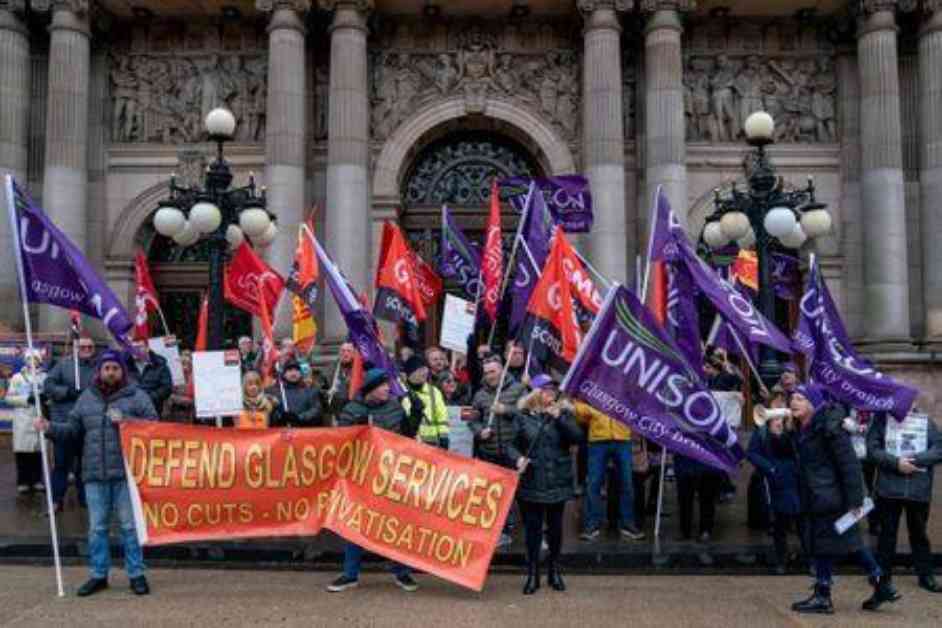Union Warns of Potential Increase in Worker Strikes Over Pay Disputes in Glasgow
A union in Glasgow is sounding the alarm, warning that more workers could be gearing up to go on strike over pay disputes. UNISON, Scotland’s largest local government union, is considering expanding its strike ballot to include over 90,000 staff in councils and associated services, the organization confirmed.
The strikes have so far impacted school workers and cleansing staff, but with the potential widening of the strike ballot, all council members of the union could potentially participate in industrial action. This move comes on the heels of the overwhelming rejection of Cosla’s latest pay offer in a consultative ballot just a week ago. The current offer from the employer organization includes an hourly uplift of £0.67 or a 3.6% increase, whichever is higher.
However, UNISON argues that this offer falls short of expectations, especially in light of the 25% real-terms pay cut that workers have endured over the past 14 years. The union anticipates that it will take several weeks to establish a firm timetable, but the intention is to gauge the willingness of all council workers it represents in Scotland to go on strike over pay.
Subheadings:
## The Call for Fair Compensation
## The Impact of Pay Disputes on Essential Services
## The Path Forward: Resolving the Pay Disputes
Colette Hunter, chair of the UNISON Scotland local government committee, expressed the frustrations of council workers, stating, “Thousands of council workers have overwhelmingly rejected COSLA’s pay offer. They are demanding a fair increase to prevent their pay from consistently lagging behind and to ensure their wage rise aligns with other sectors of the economy. They are outraged that the current offer falls significantly short of their pay claim, and is well below the 5.5% being offered to their NHS colleagues.”
David O’Connor, UNISON Scotland local government lead, emphasized the essential role that council staff play in keeping society functioning smoothly. He stated, “Council staff provide essential services that keep society running. They are simply asking for a fair and equitable pay increase. Councils are currently in crisis. They face significant recruitment challenges as workers are expected to do more with fewer resources and lower wages. This situation places immense pressure on both the workers and the services they deliver. The only viable solution is to grant these dedicated staff the pay rise they rightfully deserve.”
The Call for Fair Compensation
The issue of fair compensation for workers in Glasgow is not a new one. Over the years, council employees have seen their purchasing power erode as their salaries fail to keep pace with the rising cost of living. The current pay offer from Cosla, while seemingly a step in the right direction, is viewed by many as inadequate given the financial strain that workers have been under for more than a decade.
UNISON’s push for a fair increase in wages is not just about addressing past grievances but also about ensuring that council workers are able to sustain themselves and their families in the face of ever-increasing expenses. The union’s call for equitable compensation reflects a broader sentiment among workers who feel undervalued and undercompensated for the vital services they provide to the community.
The Impact of Pay Disputes on Essential Services
The looming threat of worker strikes over pay disputes in Glasgow is not just a matter of concern for the employees themselves; it also has significant implications for the delivery of essential services to the public. As council workers consider taking industrial action to demand fair compensation, the potential disruption to services such as education, sanitation, and social care cannot be understated.
School closures, delays in waste collection, and reduced access to vital support services are just a few examples of the fallout that could result from widespread strikes among council workers. The ripple effects of these disruptions would be felt by residents across Glasgow, highlighting the interconnectedness of public services and the critical role that council employees play in maintaining the fabric of society.
The Path Forward: Resolving the Pay Disputes
Despite the challenges and tensions surrounding pay disputes in Glasgow, there is a glimmer of hope for a resolution that satisfies both council workers and the authorities. Finding common ground and reaching a mutually acceptable agreement on pay increases requires open communication, transparency, and a willingness to prioritize the well-being of workers and the community.
By engaging in constructive dialogue and negotiation, both parties can work towards a sustainable solution that addresses the concerns of council employees while also taking into account the financial constraints faced by local authorities. Recognizing the value of the services provided by council workers and acknowledging their contributions to the smooth functioning of society are essential steps towards fostering a culture of respect and fairness in the workplace.
In the days and weeks ahead, the focus will be on finding a way forward that honors the dedication and hard work of council employees while also safeguarding the interests of the public. By approaching pay disputes with a spirit of collaboration and cooperation, Glasgow has the opportunity to emerge stronger and more unified, with a renewed commitment to supporting its workers and ensuring the continued provision of essential services to the community.
In Conclusion:
The potential increase in worker strikes over pay disputes in Glasgow serves as a stark reminder of the challenges faced by council employees in their quest for fair compensation. UNISON’s efforts to mobilize workers and push for equitable pay increases underscore the pressing need for a resolution that recognizes the value of their contributions and addresses the longstanding grievances that have eroded their purchasing power.
As negotiations continue and tensions simmer, the path forward lies in finding common ground, fostering open dialogue, and prioritizing the well-being of both workers and the community. By working together towards a sustainable solution that upholds the dignity and rights of council employees, Glasgow can pave the way for a more equitable and harmonious relationship between workers and authorities, ensuring the continued delivery of essential services to all residents.















